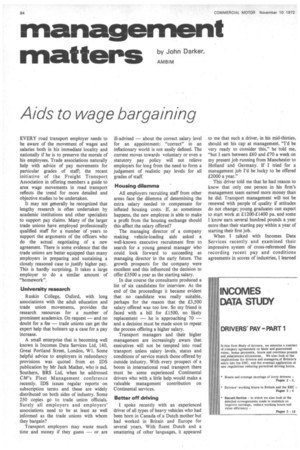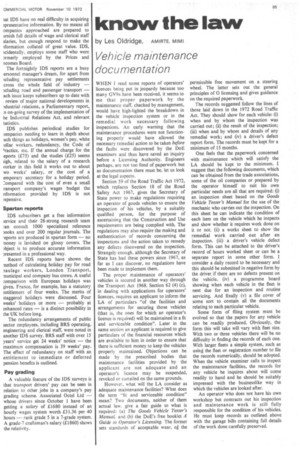management matters
Page 82

Page 83

If you've noticed an error in this article please click here to report it so we can fix it.
by John Darker,
AMBIM
Aids to wage bargaining
EVERY road transport employer needs to be aware of the movement of wages and salaries both in his immediate locality and nationally if he is to preserve the morale of his employees. Trade associations naturally help with advice of pay movements for particular grades of staff; the recent initiative of the Freight Transport Association in offering members a guide to area wage movements in road transport reflects the trend for more detailed and objective studies to be undertaken.
It may not generally be recognized that lengthy research is often undertaken by academic institutions and other specialists to support pay claims. Many of the larger trade unions have employed professionally qualified staff for a number of years to support the arguments of the officers who do the actual negotiating of a new agreement. There is some evidence that the trade unions are better equipped than many employers in preparing and sustaining a closely reasoned case to justify higher pay. This is hardly surprising. It takes a large employer to do a similar amount of "homework".
University research Ruskin College, Oxford, with long associations with the adult education and trade union movements, provides the research resources for a number of prominent academics. On request — and no doubt for a fee — trade unions can get the expert help that bolsters up a case for a pay increase.
A small enterprise that is becoming well known is Incomes Data Services Ltd, 140, Great Portland Street, London, Wl. Some helpful advice to employers in redundancy provisions was quoted from an IDS publication by Mr Jack Mather, who is ind, Southern, BRS Ltd, when he addressed CM's Fleet Management conference recently. IDS issues regular reports on subscription terms and these are widely distributed on both sides of industry. Some 250 copies go to trade union officials. Surely all employers and employers' associations need to be at least as well informed as the trade unions with whom they bargain?
Transport employers may waste much time and money if they guess — or are ill-advised — about the correct salary level for an appointment; "correct" in an inflationary world is not easily defined. The current moves towards voluntary or even a statutory pay policy will not relieve employers for long from the need to form a judgement of realistic pay levels for all grades of staff.
Housing dilemma All employers recruiting staff from other areas face the dilemma of determining the extra salary needed to compensate for inflated housing costs. If, as sometimes happens, the new employee is able to make a profit from the housing exchange should this affect the salary offered?
The managing director of a company making vehicle-loading aids asked a well-known executive recruitment firm to search for a young general manager who could look forward to succeeding as managing director in the early future. The growth prospects for the company were excellent and this influenced the decision to offer £3500 a year as the starting salary.
In due course the consultants produced a list of six candidates for interview. At the end of the proceedings it became evident that no candidate was really suitable, perhaps for the reason that the £3,500 salary offered was too low. So my friend is faced with a bill for £1500, no likely replacement — he is approaching 70 — and a decision must be made soon to repeat the process offering a higher salary.
Transport managers and their higher management are increasingly aware that executives will not be tempted into road transport unless salary levels, status and conditions of service match those offered by outside industry. With every prospect of a boom in international road transport there must be some experienced Continental drivers who with a little help would make a valuable management contribution on Continental services.
Better off driving I spoke recently with an experienced driver of all types of heavy vehicles who had been born in Canada of a Dutch mother but had worked in Britain and Europe for several years. With fluent Dutch and a smattering of other languages, it appeared to me that such a driver, in his mid-thirties, should set his cap at management. "I'd be very ready to consider this," he told me, "but I earn between £60 and £70 a week on my present job running from Manchester to Holland and Germany. If I tried for a management job I'd be lucky to be offered £2000 a year."
This driver told me that he had reason to know that only one person in his firm's management team earned more money than he did. Transport management will not be renewed with people of quality if attitudes do not change; young graduates can expect to start work at £1200-£1400 pa. and some I know earn several hundred pounds a year more than their starting pay within a year of starting their first job.
When I talked with Incomes Data Services recently and examined their impressive system of cross-referenced files recording recent pay and conditions agreements in scores of industries, I learned tat IDS have no real difficulty in acquiring epresentative information. By no means all ompanies approached are prepared to Irnish full details of wage and clerical staff alaries, but enough respond to make the lformation collated of great value. IDS, Icidentally, employs some staff who were mmerly employed by the Prices and ncomes Board, The fortnightly IDS reports are a busy ersonnel manager's dream, for apart from winding representative pay settlements cross the whole field of industry — winding road and passenger transport — ach issue keeps subscribers up to date with • review of major national developments in idustrial relations, a Parliamentary report, n on-going survey of the implementation of he Industrial Relations Act, and relevant tatistics.
IDS publishes periodical studies for :ompanies needing to learn in depth about uch things as holidays, women's pay, white :ollar workers, redundancy, the Code of )ractice, etc. If the annual charge for the eports (£75) and the studies (£25) seems fish, related to the salary of a research worker in this field it works out to about wo weeks' salary, or the cost of a emporary secretary for a holiday period. 2ompared with the cost of even a small ran sport company's wages budget the nformation provided by IDS is not :xpensive.
Spartan reports
IDS subscribers get a free information >ervice and their 28-strong research team :an consult 1000 specialized reference }ooks and over 200 regular journals. The .eports are produced in spartan form — no noney is lavished on glossy covers. The )bject is to produce accurate information Dresented in a professional way.
Recent IDS reports have shown the method of calculating holiday pay for road aaulage workers, London Transport, municipal and company bus crews. A useful :omparison with European holidays was given. France, for example, has a statutory entitlement of four weeks. The merits of staggered holidays were discussed. Four weeks' holidays or more — probably at enhanced rates — is a distinct possibility in the UK before long.
The redundancy arrangements of public sector employees, including BRS operating, engineering and clerical staff, were noted in another IDS survey. BRS staff with over 15 years' service get 24 weeks' notice — the maximum compensation is 39 weeks' pay. The effect of redundancy on staff with an entitlement to immediate or deferred pension benefits is outlined.
Pay grading
A valuable feature of the IDS surveys is that transport drivers' pay can be seen in relation to other jobs in a company's pay grading scheme. Associated Octel Ltd -whose drivers since October 1 have been getting a salary of £1680 instead of an hourly wages system worth £31.36 per 40 hours — rank grade 5 in a 7-grade system. A grade-7 craftsman's salary (£1860) shows the relativity.




































































































































